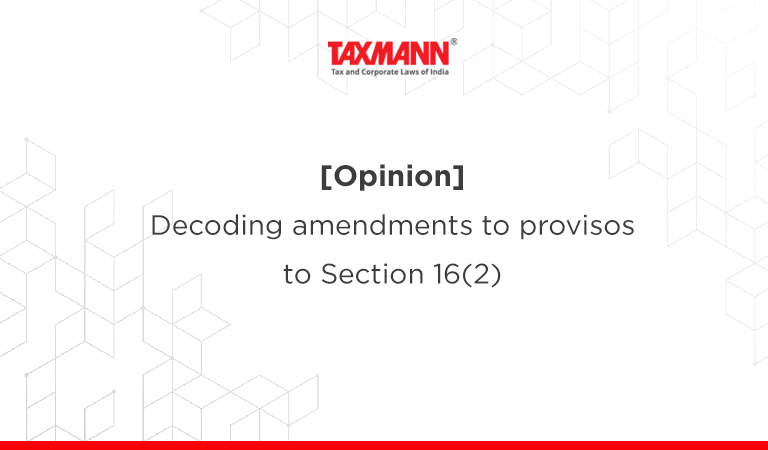[Opinion] Decoding amendments to provisos to Section 16(2) of the CGST Act
- News|Blog|GST & Customs|
- 2 Min Read
- By Taxmann
- |
- Last Updated on 15 February, 2023

The Goods and Services Tax law provides for safeguard to the supplier by denying the benefit of ITC to the recipient where he fails to pay consideration within 180 days. However, the ramifications of the provision has been haunting genuine recipients since the inception of GST law.
The Finance Bill, 2023 proposes to amend second proviso to Section 16(2) of the CGST Act to provide that where recipient fails to pay to the supplier, amount towards value of supply along with tax payable within 180 days from issue of invoice by the supplier, an amount equal to ITC availed by recipient shall be paid by him along with interest payable under Section 50 in such manner as may be prescribed.
Hence, where the recipient has an obligation to pay and does not make the payment within 180 days from the date of invoice, he shall be required to pay or reverse the amount of value not paid and proportionate ITC along with interest.
The existing provision states that the aforesaid amount equal to ITC availed by recipient shall be added to his output tax liability along with interest thereon.
According to the Memorandum explaining the provisions in the Finance Bill, 2023, the said amendment has been brought in order to align the said sub-sections with the return filing system provided in the said Act. However, it is imperative to note that the words ‘shall be added to his output tax liability’ have been substituted.
A. Pay or reverse the amount of value and proportionate ITC
- For understanding the purpose of the aforesaid change, the changes to the corresponding Rule 37 of the CGST Rules are to be noted. The said rule before its substitution w.e.f. 01.10.2022, stated that ITC on account of delay in payment was to be added to the output tax liability of recipient for the month in which the amount of value not paid and proportionate ITC is furnished in GSTR-2. The same was substituted and now states that the recipient shall ‘pay or reverse’ such proportionate ITC while furnishing GSTR-3B.
- Meaning thereby, it was only after the above amendment that Rule 37 clearly specified that ITC on account of delay in payment was to be reversed/paid in GSTR-3B.
- However, even in light of the same, existing provision was not amended to the said effect to incorporate an enabling clause stating that the recipient shall ‘pay or reverse’ the said ITC.
- Also, Table 4 of the GSTR-3B was amended to provide for reporting of reversal of ITC in case of failure to make payment to supplier within 180 days from date of invoice under Table 4(B)(2) of GSTR-3B.
The unamended provision was requiring the amount to be added to output tax liability instead of payment/reversal. The proposed amendment has aligned the provision with the format of return to provide for reversal.
Click Here To Read The Full Article
Disclaimer: The content/information published on the website is only for general information of the user and shall not be construed as legal advice. While the Taxmann has exercised reasonable efforts to ensure the veracity of information/content published, Taxmann shall be under no liability in any manner whatsoever for incorrect information, if any.

Taxmann Publications has a dedicated in-house Research & Editorial Team. This team consists of a team of Chartered Accountants, Company Secretaries, and Lawyers. This team works under the guidance and supervision of editor-in-chief Mr Rakesh Bhargava.
The Research and Editorial Team is responsible for developing reliable and accurate content for the readers. The team follows the six-sigma approach to achieve the benchmark of zero error in its publications and research platforms. The team ensures that the following publication guidelines are thoroughly followed while developing the content:
- The statutory material is obtained only from the authorized and reliable sources
- All the latest developments in the judicial and legislative fields are covered
- Prepare the analytical write-ups on current, controversial, and important issues to help the readers to understand the concept and its implications
- Every content published by Taxmann is complete, accurate and lucid
- All evidence-based statements are supported with proper reference to Section, Circular No., Notification No. or citations
- The golden rules of grammar, style and consistency are thoroughly followed
- Font and size that’s easy to read and remain consistent across all imprint and digital publications are applied



 CA | CS | CMA
CA | CS | CMA
